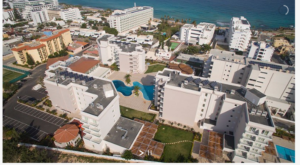Greece: Tax Incentives Benefit National Economy
January 5, 2016
 Greece’s solar water heater manufacturers have proved to be highly resilient at a time when the country is in economic crisis. The collector manufacturers were able to increase both domestic (+19 %) and export (+16 %) sales in 2014, according to the Greek Solar Industry Association, EBHE. The industry provides a high level of vertical integration and exports 50 % of its annual production volume. EBHE promotes a number of measures to keep business growing for its members. At the beginning of the year, the association and industry sponsors commissioned the Greek Foundation for Economic & Industrial Research, IOBE, to carry out a survey on the economic impact of a domestic tax reduction scheme. The survey results are now available and EBHE’s President, Panayis Konstantinidis, has already been in several meetings with ministry officials and members of parliament. The photo shows Konstantinidis (left) with Kostis Hatzidakis, Member of Parliament and former Minister of Development, during a discussion in September 2015.
Greece’s solar water heater manufacturers have proved to be highly resilient at a time when the country is in economic crisis. The collector manufacturers were able to increase both domestic (+19 %) and export (+16 %) sales in 2014, according to the Greek Solar Industry Association, EBHE. The industry provides a high level of vertical integration and exports 50 % of its annual production volume. EBHE promotes a number of measures to keep business growing for its members. At the beginning of the year, the association and industry sponsors commissioned the Greek Foundation for Economic & Industrial Research, IOBE, to carry out a survey on the economic impact of a domestic tax reduction scheme. The survey results are now available and EBHE’s President, Panayis Konstantinidis, has already been in several meetings with ministry officials and members of parliament. The photo shows Konstantinidis (left) with Kostis Hatzidakis, Member of Parliament and former Minister of Development, during a discussion in September 2015. - Implementing a tax credit which allows investors to deduct a certain share of the investment costs for a solar thermal system (between 10 and 50 %) on their upcoming tax declaration. Here, there are two alternatives under discussion: A tax reduction for all newly installed systems (A) and a tax reduction which requires certain criteria to be met, i.e., first-time installations, solar for let flats, income level (B). Such a tax credit had been in place in Greece since 2006 and was very popular among end consumers.
- Reducing end-consumer VAT for solar water heaters from 23 to 13 % (C). This would bring the VAT rate in line with the one for gas and electricity, which are clear competitors of solar water heater technology. Such a reduction would have two advantages: reducing solar water heater end costumer prices and increasing the share of invoiced solar water heater sales. At this time, the association assumes that 35 % of the products are sold without a receipt.
|
|
Scenario A: |
Scenario B: |
Scenario C: |
|
Increase in |
13,500 to 40,500 |
13,500 to 40,500 |
3,680 to 11,041 |
|
Tax credit costs |
-29 to -37 million EUR |
-3.8 to -11.5 million EUR |
-1.0 to -0.6 million EUR |
|
Government |
+11.9 to +24.7 million EUR |
+5.9 to +17.7 million EUR |
+1.6 to +4.7 million EUR |
|
Net money flow |
-17.6 to -12.4 million EUR |
+2.0 to +6.1 million EUR |
+0.6 to +4.1 million EUR |
|
New jobs |
379 to 1,136 |
379 to 1,136 |
103 to 310 |


